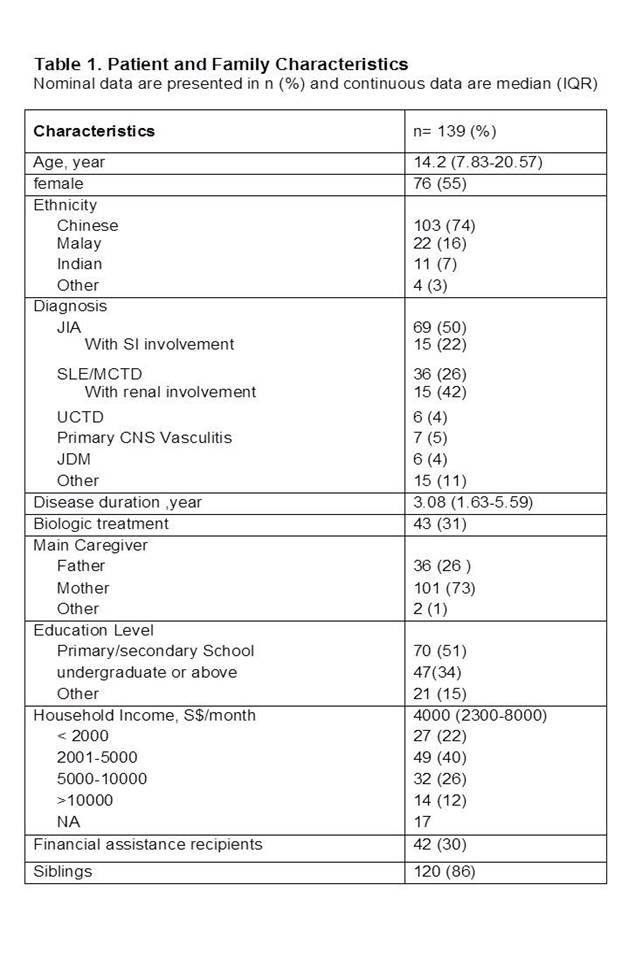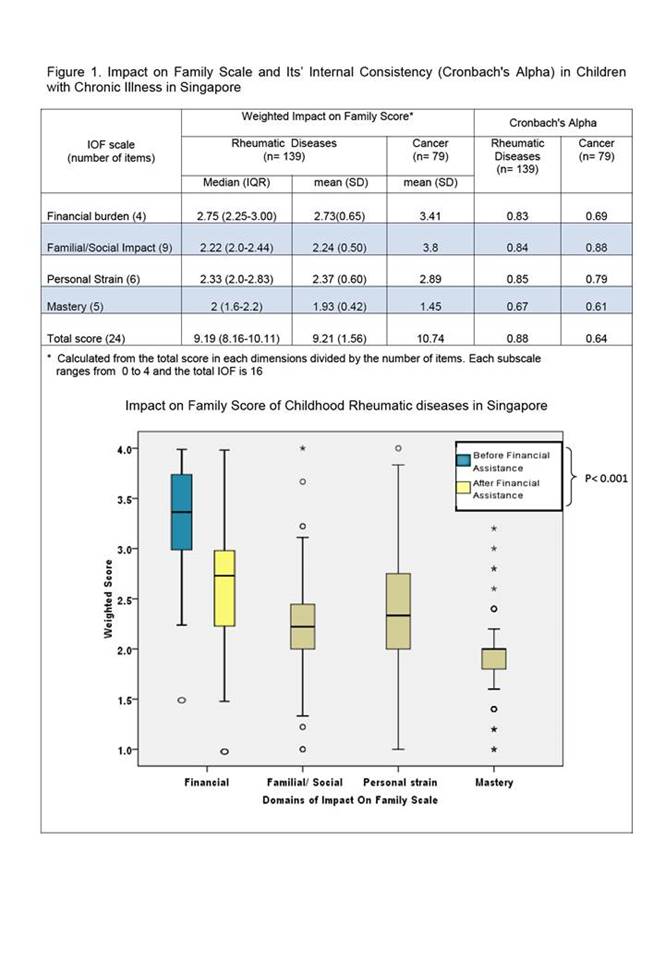Session Information
Session Type: ACR Poster Session C
Session Time: 9:00AM-11:00AM
Background/Purpose:
Rheumatic diseases
(RD) in children, being complex and chronic in nature, do not only pose
physical insult to the affected child, but also psychological and socioeconomic
impacts to the families. Data on impact to the families are scarce. We aim to
assess the financial and psychosocial impacts on family confronting with such
conditions in our cohort of children with RD in Singapore.
Methods:
Patients with chronic
RD were recruited. The Impact on Family (IOF) scale was completed by the
caregivers. The weighted IOF score was calculated from the total of 24 items in
4 dimensions; financial burden (FB), familial/social impact (FS), personal
strain (PS) and mastery (MT) with possible scores 0-4 for each domain, the
higher, the more impact. In financial aid recipients, FB was collected before
and after the financial helps. Nonparametric tests were used for comparative
analysis. Correlation studies were performed to address the association of
family factors to IOF.
Results:
139 children were
recruited (55% female, median age 14.2, 7.8-20.6 years).Majority were Chinese
(74%), followed by Malays (16%). The prominent diagnosis were JIA (50%) and SLE
(26%). 1/3 were on biologics. 76 families (62%) earned < 5000 S$/month and
30% received financial assistance.
The internal consistency of the total IOF and subscales indicated
high reliability (shown in Figure 1), except MT
which posed Cronbach’s alpha of 0.67.
Our RD patients’ IOF
scores were of milder degree (FB, FS, PS) compared to those with childhood
cancers in a previous local study. FB negatively
correlated to household income (rho = -0.51) but it was markedly alleviated
after receiving financial aid (3.38 vs. 2.75, p< 0.001). Despite lowest
income/high FB, Malay/Indian parents seemed to cope with diseases better. The
highest FS, PS and total IOF were seen in CNS vasculitis (explained by debility
and dependent status), while SLE affected FB the most. Lupus nephritis and
sacroiliitis in JIA did not render higher family impact. Neither were age, disease
duration, biologics treatment, caregiver education nor the presence of siblings
associated with higher IOF.
Conclusion:
Pediatric rheumatic
diseases in Singapore affect various aspects of the family at a considerable
degree. Although household income inversely correlates with FB, none of other strong
associations was demonstrated between family factors and IOF scores. As we are
seeking methods to minimize impact of chronic diseases on families, IOF scale seems
to be a useful tool in assessing disease burdens which, overall, will help
improving disease outcome and ascertain effective healthcare supporting system.
To cite this abstract in AMA style:
Hoh SF, Tanya M, Tan JHT, Das L, Arkachaisri T. Psycho-Socio-Economic Burdens of Childhood Onset Rheumatic Diseases on Families [abstract]. Arthritis Rheumatol. 2015; 67 (suppl 10). https://acrabstracts.org/abstract/psycho-socio-economic-burdens-of-childhood-onset-rheumatic-diseases-on-families/. Accessed .« Back to 2015 ACR/ARHP Annual Meeting
ACR Meeting Abstracts - https://acrabstracts.org/abstract/psycho-socio-economic-burdens-of-childhood-onset-rheumatic-diseases-on-families/


